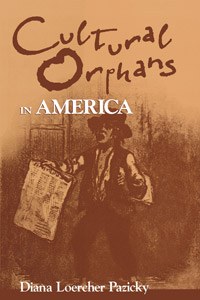

具体描述
Images of orphanhood have pervaded American fiction since the colonial period. Common in British literature, the orphan figure in American texts serves a unique cultural purpose, representing marginalized racial, ethnic, and religious groups that have been scapegoated by the dominant culture. Among these groups are the Native Americans, the African Americans, immigrants, and Catholics. In keeping with their ideological function, images of orphanhood occur within the context of family metaphors in which children represent those who belong to the family, or the dominant culture, and orphans represent those who are excluded from it. In short, the family as an institution provides the symbolic stage on which the drama of American identity formation is played out.
Applying aspects of psychoanalytic theory that pertain to identity formation, specifically René Girard's theory of the scapegoat, Cultural Orphans in America examines the orphan trope in early American texts and the antebellum nineteenth-century American novel as a reaction to the social upheaval and internal tensions generated by three major episodes in American history: the Great Migration, the American Revolution, and the rise of the republic. In Puritan religious texts and Anne Bradstreet's poetry, orphan imagery expresses the doubt and uncertainty that shrouded the mission to the New World. During the Revolutionary and post-Revolutionary periods, the separation of the colony from England inspired an identification with orphanhood in Thomas Paine's writings, and novels by Charles Brockden Brown and James Fenimore Cooper encode in orphan imagery the distinction between Native Americans and the new Americans who have usurped their position as children of the land. In women's sentimental fiction of the 1850s, images of orphanhood mirror class and ethnic conflict, and Uncle Tom's Cabin, like Frederick Douglass's autobiographies, employs orphan imagery to suggest the slave's orphanhood from the human as well as the national family.
作者简介
Diana Loercher Pazicky has taught multiethnic literature at Rider University and is currently a member of the Integration of Knowledge Department at Bucks County Community College. She was formerly a staff correspondent for the Christian Science Monitor.
目录信息
读后感
评分
评分
评分
评分
用户评价
相关图书
本站所有内容均为互联网搜索引擎提供的公开搜索信息,本站不存储任何数据与内容,任何内容与数据均与本站无关,如有需要请联系相关搜索引擎包括但不限于百度,google,bing,sogou 等
© 2026 book.wenda123.org All Rights Reserved. 图书目录大全 版权所有




















